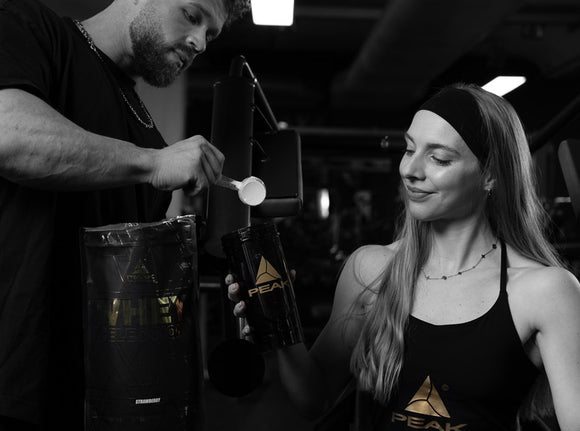How does muscle maintenance work? Tough times with special conditions!
The more days pass with contact restrictions and closures of all venues for leisure and fun, the more unbalanced we become.
And when all of this causes us to lose hard-earned muscle mass, there's only one word for it - CATASTROPHE.
For this reason, I would like to give you 5 tips today on how you can put a stop to muscle loss!
Tip 1 - Don't stop training
One thing is certain - if you stop training completely for longer than 2 weeks, you run the risk of losing both aerobic and anaerobic performance as well as muscle mass (1 - 5).
On the other hand, physical exertion triggers our system in such a way that muscle mass is still seen as a necessity and should therefore be maintained. A large number of studies show not only that we need training to build muscle mass, but also to maintain it (6 - 10).
Which training is most effective?

Virreal et al (6), for example, investigated this question. They placed their test subjects in a greater calorie deficit and divided them into 3 groups to complete the following training 3 times a week:
- 60 minutes of cardio training
- 60 minutes of strength training
- 75 - 90 minutes a combination of both
There was no statistically significant difference in fat loss between the groups. What was clearly different, however, was the change in muscle mass. While the group with cardio training lost 2.7 kg of muscle mass within 26 weeks, the group with only strength training was able to reduce the loss to 1 kilogram.
My advice
Maintaining muscles requires that you regularly challenge them in the sense of exertion. Strength training is the most effective method for this.
Tip 2 - Eat enough calories
Just like muscular exertion, calorie intake also acts as a kind of signal and control instrument for gaining or losing body mass.
Studies with so-called VLCD (Very Low Calorie Diets) in the range of 400 to 800 calories per day report that a considerable proportion of the body weight lost consists not only of fat mass but also of fat-free mass and, in this context, of muscle mass (11, 12). Even a moderate calorie reduction of only 20% of the actual requirement results in a decrease in fat-free mass (13).
My advice
Provide yourself with enough calories to cover your daily requirements and thus protect muscle mass. Adequate nutrition can help you maintain muscle mass as well as your shape.
Tip 3 - Eat enough protein
In addition to water, muscles consist to a not inconsiderable extent of protein structures. The constant build-up and breakdown of protein in the body (called protein turnover) affects our muscles just as much as we try to damage them specifically through strength training in order to trigger new adaptations. These arguments suggest that an adequate supply of protein is also an important link for the best possible muscle maintenance.
How much do we need?
Assuming a high level of sporting activity, a recent study currently assumes that muscle mass can best be built up with a threshold amount of around 1.6 g of protein per day, assuming good distribution and the use of only high-quality sources (14). Another study considers a quantity of 2.0 g protein per kilogram of body weight to be necessary to maximize muscle growth in trained athletes (15). For a deficient supply of calories, amounts of 2.3 to 3.1 g of protein per kilogram of body weight are even recommended (16).
My advice
If you want to maintain muscle in the best possible way, ensure a protein intake in the range of 1.6 to 3.1 g per kilogram of body weight, depending on your calorie intake and the quality of your protein sources.
Tip 4 - Stay healthy
Everything mentioned so far assumes good health! Only if I am healthy can I train and follow an optimized nutrition plan for maximum muscle maintenance.
We all know by now that training influences the immune system, while moderate exercise promotes immune performance, intensive exercise tends to cause immunosuppression.
Less well known is the fact that an immune system that is already weakened or stressed by other demands significantly impairs regeneration and, in this context, adaptation processes following training (17).
My advice
Do everything you can to stay healthy during this time!
Tip 5 - Don't let yourself get stressed
Mental stress is not only considered to be highly immunosuppressive (18), it can also stand in the way of muscle maintenance. The stress hormone cortisol with its overall catabolic (degrading) influence on the body is to blame for this theory (19).
While a physiologically normal level of cortisol performs highly important tasks in the body, an excess level poses a problem, sometimes for muscle mass. Initial studies from 1970 (20) show that an excess of cortisol promotes muscle breakdown and in particular the breakdown of type 2 fibers. It is precisely these types of fibers that we need for fast, intensive strength performance, but also for hypertrophy. New studies confirm the link between increased cortisol levels and a tendency to muscle loss (20, 21).
My advice
Stay balanced even in these difficult times! Stress arises primarily in the mind. It ultimately determines not only how strong your immune system is, but also whether you lose or retain muscle.
Sporty greetings
Holger Gugg
www.body-coaches.de
Sources
(1) https://journals.lww.com/nsca-jscr/Fulltext/2017/04000/Resistance_Training_Induced_Elevations_in_Muscular.1.aspx
(2) https://link.springer.com/article/10.1007%2Fs40279-013-0031-3
(3) https://www.medicaljournals.se/jrm/content/abstract/10.2340/16501977-1961
(4) https://journals.physiology.org/doi/abs/10.1152/jappl.1984.57.6.1857
(5) https://journals.physiology.org/doi/abs/10.1152/jappl.1993.75.4.1444
(6) https://www.nejm.org/doi/10.1056/NEJMoa1616338
(7) https://www.ncbi.nlm.nih.gov/pmc/articles/PMC5946208/
(8) https://www.ncbi.nlm.nih.gov/pmc/articles/PMC5421125/
(9) https://www.ncbi.nlm.nih.gov/pubmed/30870215
(10) https://www.researchgate.net/publication/19819352_Resistance_weight_training_during_caloric_restriction_enhances_lean_body_weight_maintenance
(11) https://www.ncbi.nlm.nih.gov/pubmed/8383636
(12) https://www.ncbi.nlm.nih.gov/pubmed/28630601
(13) https://www.ncbi.nlm.nih.gov/pmc/articles/PMC5161655/
(14) https://www.ncbi.nlm.nih.gov/pubmed/28698222
(15) https://www.ncbi.nlm.nih.gov/pubmed/28179492
(16) https://www.ncbi.nlm.nih.gov/pubmed/28630601
(17) https://www.germanjournalsportsmedicine.com/archiv/archiv-2019/issue-10/the-role-of-the-immune-system-in-response-to-muscle-damage/
(18) https://www.ncbi.nlm.nih.gov/pubmed/12909458
(19) https://www.ncbi.nlm.nih.gov/pmc/articles/PMC4315033/
(20) https://jamanetwork.com/journals/jamaneurology/article-abstract/569497
(21) https://academic.oup.com/jcem/article/92/9/3553/2597859







